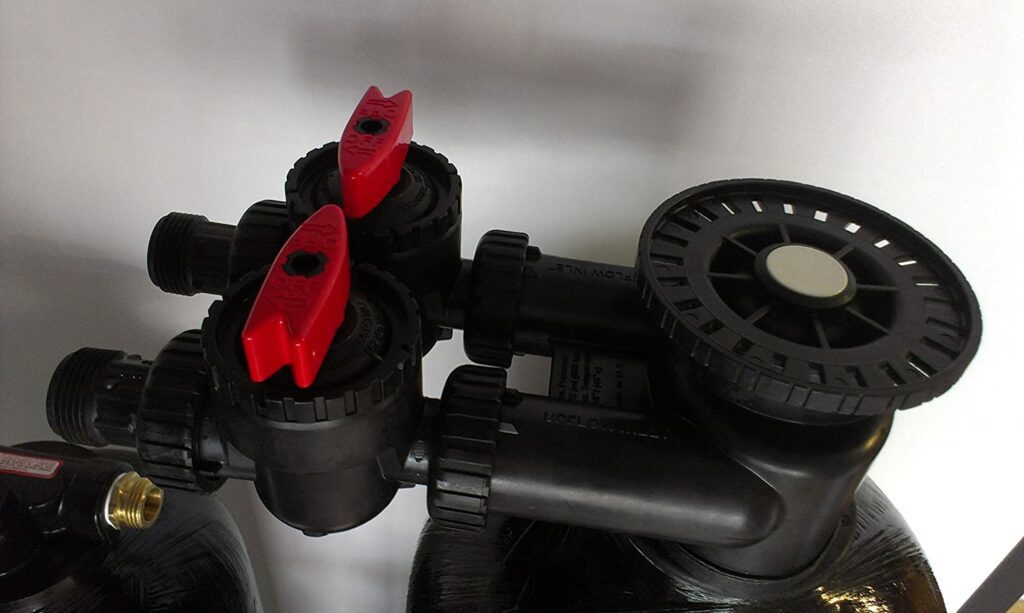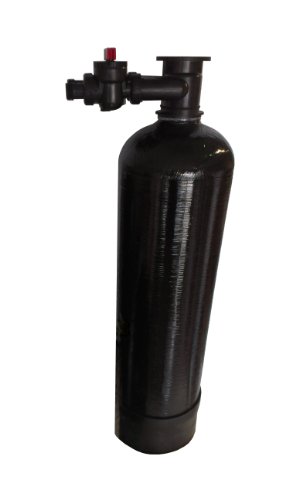If you’ve ever noticed your skin get dry and itchy or your dishes and laundry are riddled with stains, you’re most likely dealing with hard water problems.
Table Of Contents
−- What Is Hard Water?
- Why hard water Is not ideal
- How to know you need a water softener
- Types of water softener
- How to choose the right water softener
- What is a Clack water softener?
- What makes Clack water softener unique?
- Pricing information
- What does the public think of clack?
- Measuring up to the competition
- Our thoughts
And if you’re looking to make those problems a thing of the past, the excellent Clack corporation team offers many products for all your water needs.

In this article, we’ll explore everything you need to know about water softeners, plus we’ll hand you a comprehensive guide in picking the Clack Water softener of your choice.
What Is Hard Water?
Hard water is a generic term for fresh household water that contains at least 60mg of dissolved minerals like calcium and magnesium. These minerals are absorbed from the earth, and they can be much higher in specific areas.
Hard water is not toxic or harmful, but its effects can be challenging, from increased money costs to difficulty in doing your laundry.
Why hard water Is not ideal
Hard water attracts a bunch of problems in your household. For one, it’s tough on appliances, causing them to lose shape, deteriorate and perform poorly over time.
This problem increases the money you’ll spend getting those appliances fixed or finding new ones.
And that’s not even the end, because soap and detergents do not lather properly, affecting your washing machine and clothes.
Due to its tendency to get cloudy, it also leaves crusty and irritating deposits on kettles and pots, making cleaning a pain.
How to know you need a water softener
Water is most enjoyed when it’s soft. You can instantly tell the difference and know if your water is hard or not from your overall experience.
This section is divided into signs and tests that give you a clear picture.
First, we’ll review clear signs indicating you probably need a water softener.
These signs are relatively easy to spot, but just in case you have difficulty, we’ve included a few tests you can also try out.
The Signs
You don’t need a genius IQ to identify any of these signs. They’re straightforward telltale signs that you need a water softener;
First, your skin and air around your house feel dry, causing your body and hair to itch.
You’ll also notice calcium scale (limescale) build-ups on your kitchen utensils, faucets, bathtubs, and even the plumbing pipes.
Your clothes will also show a considerable degree of fading and grayness. Due to large amounts of mineral substances in your water, laundry will become a tough task.
The Test
To get the best result, take a water sample from your house to a certified water – testing laboratory. This should cost you about $90, and you’ll receive a full breakdown of mineral content to other substances like nitrates and dangerous bacteria.
If you want something on the cheaper side, you can get a water test kit for $12 from a home improvement store.
You can also perform a DIY test; take half a cup of tap water and add 5 – 10 drops of liquid dish soap. Then, shake in a bottle for 30 seconds.
If you notice a thick lather forming on top, you probably don’t have hard water and shouldn’t bother about getting a water softener.
Types of water softener
All water softeners come in 2 main types, each with striking pros and cons.
1)Ion exchange/Salt based. This is the most common water softener in the market. It works by using the ionizing power of salt through its sodium ions to remove calcium and magnesium ions that cause hardness in water.
The device includes a large tank for salt pellets. It’s very effective for large households and areas with extreme hardness.
However, the downside is that it removes healthy minerals and costs more.
2) Salt-free: As the name implies, they don’t make use of salt, and this, in turn, makes them an affordable alternative.
They are smaller and won’t take up much room in your house.
However, they filter or condition water rather than soften it.
The mechanical filter removes the calcium, but it’s not efficient in treating hard water due to its incapability to remove magnesium.
How to choose the right water softener
This is a big decision for your home with the possibility of attracting a high price tag.
So, it’s essential to do your due diligence and ensure you’re armed with the correct information to enhance your buying decision.
To achieve this, we’ll summarize essential information to shape your understanding of the various features and methods linked to water softeners.
Area Size:
Quite obvious, we know, but it makes a difference. You don’t want to go for a huge water softener when the area around your pipes is small.
Most families would do great with a mid-range 2-piece device featuring dual tanks for iron and brine.
Grain Capacity.
This is one of the most important things to consider if you’re going for a salt-based water softener. The resin or grain capacity indicates how much hardness the softener can handle within a specific period before it regenerates.
A grain capacity of 90,000 has more resins and can handle higher hardness levels than one of 20,000. The capacity also affects the brine tank. Higher amounts of resin mean more salt will be required.
A larger capacity reduces the frequency of regeneration of the water softener.
Regeneration control panel.
Most water softeners fall into two different categories when it comes to controlling the amount of regeneration. Some are metered water softeners, while others are timed ones.
You’ll want to go for a metered system because the resins regenerate after using a certain amount of water. The desired number decision is made and set by you.
The time-based system is much different. The resins regenerate every few days. Your household water usage patterns determine the amount of water you would use.
The drawback with a time-based softener is that it increases the chances of running out of soft water if you use more water than usual.
What is a Clack water softener?
The 1940s was known for a lot of inventions. One happened in 1946 when a father and son teamed up to create one of the most iconic appliances in water systems—namely, the Clack water softener.
The clack water softener is designed with a slightly different intention.
While other water softeners rely on salt to perform, leading to an increase in money spent, clack water softener takes a different route.
It tackles hard water problems long before they make it to your plumbing lines by preventing the hard water minerals from building up on your pipes or utensils. This way, the problem is tackled before it begins.
The Clack Corporation is known for its revolutionary control valve and cost-efficient water softeners.
You’ll notice how your clothes and kitchen items sparkle as you use their softeners each day.
Your appliances will also have an increased life span, and you’ll be able to reduce your energy bills by 10%.
Clack Water Softener
Not available? Here’s an alternative
The Springwell FutureSoft is a whole-house salt-free water softener manufactured by one of the leading businesses in the water filtration and softening industry.
The highly regarded Springwell FutureSoft Salt-Free Water Softener prevents 99.6% of scale without chemicals or salt and ensures that your water pressure remains constant throughout your home.
In contrast to typical salt-based systems, the Futuresoft water softening system does not waste water and does not discharge salt brine into the environment. So today, get rid of scale, increase the life of your appliances, and make cleaning easier!
Springwell also has an excellent salt-based solution if you still require the heavy-duty water softening that a salt model delivers.
Overall, Springwell comes out ahead of Clack as our top recommendation.
What makes Clack water softener unique?
Clack aims to be the best in the water system industry. By leveraging innovative technologies, they bridge the gap between consumers and their needs.
Through set pacing inventions, they’ve created water softeners and appliances that have become leaders in the market.
With clack water softeners, you’re sure of soft water whenever you need it. At the same time, your energy bills are kept low. Making them one of the most cost-efficient devices in the industry.
Another feature that stands out like a sore thumb with Clack is the meter on their control panels. With this present, you can automate and control your water consumption.
Avoiding water wastage is ideal for environments where soft water is hard to find.
Also, let’s not forget their control timers that decide the right time for regeneration based on your water usage.
Pricing information
Clack water softener models are usually around the $500 price tag. And as with all things, as you go for larger models, the more money you’ll be expected to shell out.
Your best bet at getting your hands on an efficient Clark water softener is from Clack distributors. Unfortunately, at the moment, they do not offer online purchases of their products.
What does the public think of clack?
As we said, clack has become a favorite among many homeowners. Generally, customers have a wonderful experience with Clack models.
To top it off, their customer service is one of the best in the industry.
If you prefer a DIY approach to things, clack models are designed to give you a stress-free and reliable performance.
Measuring up to the competition
Despite its achievements, there are certainly better choices out there. However, at a price, fleck is a good competitor that gives Clack a run for their money.
They’re both industry favorites for families up to 4 and homeowners who love getting things done by themselves.
Fleck is rated the number 1 softener on Amazon. Where clack requires regular and proper maintenance, fleck practically takes care of itself.
However, they offer low water consumption, so your utility bills don’t go up. And according to homeowners, clack comes out on top when it comes to ease of repair.
Our thoughts
Bottom line, our Clack water softener review concludes that it is an excellent choice for your household. It provides all you’ll need at an excellent price.
If you have a relatively medium-sized family, it is the ideal choice if you’re looking for great value for your money.

Jay
Jay is a health and wellness enthusiast with expertise in water quality and nutrition. As a knowledgeable advocate for holistic well-being, Jay successfully manages Type 2 Diabetes through informed lifestyle choices. Committed to sharing reliable and authoritative insights, Jay combines firsthand experience with a passion for enhancing health."



